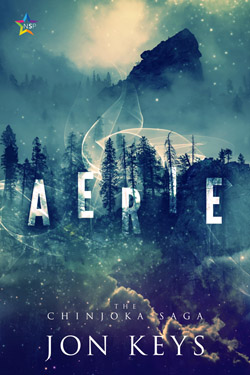 Title: Aerie
Title: Aerie
Series: Chinjoka Saga Book #1
Author: Jon Keys
Genre: Fantasy
LGBTQ+ Category: Gay
Publisher: NineStar Press
Pages: 202
Blurb: Askari, Dhala, and Gyam grew up as childhood friends during happier days for the Chinjoka, an Iron Age people with the ability to shapeshift, but now they must learn their place among the tribe while dealing with both a devastating plague and war with the Misiq.
Ena is a young warrior for the more savage Misiq, a tribe whose cruelty exemplifies their deity—the Angry God. The Misiq, also shifters, have declared a genocidal war against the Chinjoka, blaming them for the disease devastating both tribes. As a result, they are locked in a battle for survival. But when Ena is shown compassion by those he means to harm, he begins to question all he’s ever known.
A chance meeting changes their lives, and maybe their tribes, forever.
Review by Andrew
Four young men discover their soulmates, and one, a higher purpose in his tribe, in a sweet tale enriched by a fantasy perspective that is evocative of an ancient indigenous era.
The story focuses on a magical, hunter-gatherer tribe, the Chinjoka, wherein Dhala is of a caste (Saat) who are healers and custodians to their hunter and warrior brothers. It is a mark of shame that he cannot shift like the valiant members of his kind. He’s also tragically in love with a tribemate who resents the Saat for not being able to cure a plague that has decimated their people and who has rigid ideas about inter-caste bonding.
Askari is Onija with the ability to form scale armor, a warrior. His caste is especially needed as the Chinjoka are under attack by a warring tribe, the Misiq, who believe the only way to stop the plague is to rid the lands of their enemies. Askari finds a Misiq warrior Ena crushed beneath a rockslide, and his generous nature leads him to help heal the man. While Askari tends Ena, the two discover a mutual attraction that may signal something deeper, though how can they be mates when they’re from opposing tribes?
Last, Gyam is Athru, the most venerated caste because of their ability to shift into fearsome, flying raptors. They can hunt the largest beasts to feed the tribe, and they protect the people from the Misiq through powerful aerial attacks. Yet Gyam is the last of his kind and embittered by the many deaths of Athru from plague and war, while his tribe’s survival rests on his shoulders.
Aerie is quite a complex, ambitious novel, with its far-flung fantasy world and magical mythology. The names, lifestyles, creator gods, and animistic practices bring to mind indigenous lore, but it is all so freshly imagined, the book requires a glossary of terms. Furthermore, the storyline moves through alternating points of view: three closely knit narratives, and a fourth lightly interspersed (Ena’s story).
Impressively, it all comes together. Keys takes his time describing the men’s daily lives, such that the reader gets comfortably settled, invested in, and amazed by the world of the Chinjoka. There are many nice, imaginative touches, and one of my favorites is when Dhala learns from his mother the healing art of creating a portal into a sick man’s body and thereby working with the wounded’s spirit animal to repair his injury.
A lesser quibble, Aerie is a slow burn, and even the action scenes are a bit painstakingly drawn out, losing their immediacy. I found that to be forgiveable based on the book’s many charms.
Especially lovely and engaging for me is Keys’ rendering of masculinity and bonding. Keys portrays his three young principals with uncomplicated tenderness and caring for one another, appropriate for the story’s Native sensibility. Even Gyam, the most traditionally aggressive and hardened of the group, comes around to pledge his heart and soul to the man he loves surely, naturally, without question. These are young men with deep and pure emotions and communal values, and the author’s deft handling of that subject matter brings a satisfying romanticism to this story of same-sex soulmates, which can otherwise be a pat convention. Their relationships develop organically. Sex happens but is not the driving force of their partnerships. By bonding, they become stronger individually, stronger as mates working together, and stronger as a tribe that depends on collaboration and mutual support. It’s a beautifully, affirming reconstruction of gayness, which perhaps especially resonated for me amid our current climate of toxic individualism and cultural divide.
Overall, a charming romantic fantasy that pays tribute to the indigenous imagination in the style of Daniel Heath Justice’s The Way of Thorn and Thunder.
![]() Andrew Peters is an award-winning author, an educator, and an activist. His novel The City of Seven Gods won the 2017 Silver Falchion Award (Best Horror/Fantasy) and was a finalist in the 2016 Foreword INDIES (Best Sci Fi/Fantasy). He is also the author of the Werecat series, Poseidon and Cleito, and two books for young adults: The Seventh Pleiade and Banished Sons of Poseidon.
Andrew Peters is an award-winning author, an educator, and an activist. His novel The City of Seven Gods won the 2017 Silver Falchion Award (Best Horror/Fantasy) and was a finalist in the 2016 Foreword INDIES (Best Sci Fi/Fantasy). He is also the author of the Werecat series, Poseidon and Cleito, and two books for young adults: The Seventh Pleiade and Banished Sons of Poseidon.


